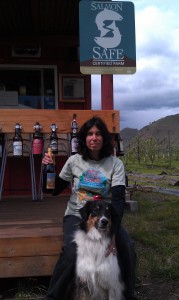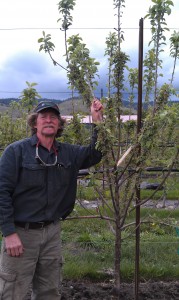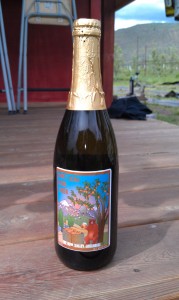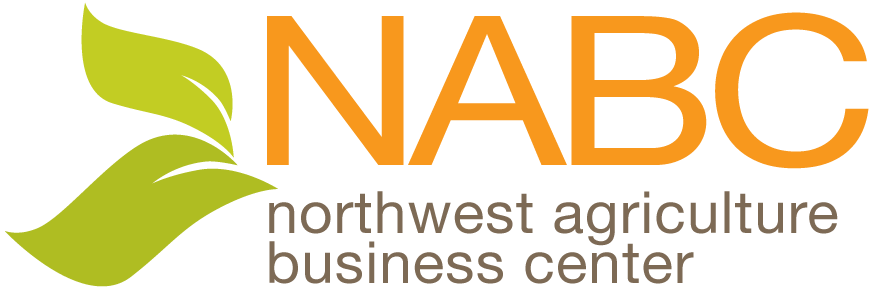Cider Culture: PSFN Visits Methow Valley Ciderhouse

On a recent visit to Winthrop, Karen Mauden stopped by to meet Richard and Lynne Wasson, Owners of the Methow Valley Ciderhouse. Their hard and sweet ciders come from their organic apples in the heart of the Methow Valley.
Most people know about the Winthrop/Mazama area for cold crisp snowy winters and cross country skiing; or the hot summers as a recreational hub for play and relaxation. But for the Wassons in 2006, it was a great place to stake over 2000 apple trees on 15 acres of ground so they could begin organic apple cultivation for the age old craft of hard cider making.
How do you go from living in Issaquah, working in construction industry to growing organic varietal apples for hard cider? Here is the timeline:

2005: Richard goes to Salem to visit his daughter in college. Stopping at coffee shop, he reads an interesting article about Wandering Angus Ciderworks in Oregon. Inspired by the article, later that year Richard attends Cider Making Classes sponsored by WSU Extension & Northwest Agricultural Business Center in Mt. Vernon. Peter Mitchell, Cider Expert and speaker inspires action. Richard & Lynne purchase the property in Winthrop. In the class, a grower from Cashmere sold Richard scion wood which would be used the following Spring to graft on to the old (40 years) Red Delicious trees.
2007: Sam & Brooke Lucy, Owners of Bluebird Grain in Mazama help work up the land. By 2008, Over 2000 new trees were planted (among them are 4 English varieties, 2 French varieties & 4 American varieties which include Macintosh, Smoothys, & Browns)
2010: 250 gallons of cider produced! These first ciders are put into bottles.
Methow Valley now has 6 English cider varieties, including:
 Eagle Screechin’ Scrumpy: Best if you like bitter flavors, this is a still cider that is flavorful and robust. Loved by those who hold English Ciders as the standard.
Eagle Screechin’ Scrumpy: Best if you like bitter flavors, this is a still cider that is flavorful and robust. Loved by those who hold English Ciders as the standard.- Pinnacle Goat: Strikes a fine balance between dry & sweet. Reminiscent of Chardonnay.
- Howling Wolf: Dangerously drinkable and delightfully effervescent, this variety is popular with beer and champagne lovers.
- Honey Bear: Sweet, refreshing and lightly carbonated, this is a great drink for those new to hard ciders.
What makes the best cider? Richard reports it is just like the wine industry – that trees 10 years and older produce the best ciders. It’s good now, but it will only get better with time!
And so is the world of Hard Cider in the Pacific Northwest – just getting better.
Washington state produced nearly two hundred thousand gallons of cider in 2011, and nationally, the hard cider market opportunity is growing in popularity by leaps and bounds. Domestic cider production has increased from 1.2 million gallons in 2010 to 2.5 million gallons in 2011. Like the microbrew industry in the 1980’s, we are at the beginning of what is to become a big booming trade that enables small growers to cultivate the land, grow apple varietals and build a traditional craft. And hopefully thrive.
In 2011 The Northwest Agriculture Business Center, in partnership with Washington State University and Northwest Cider Association, received a Specialty Crop Block Grant from the WSDA, giving a boost to the emerging hard cider industry in the region. The grant has been used to support cider research, education and marketing, including various cider courses. Upcoming hard cider classes at NABC include:
Orchard Management classes with Gary Moulton • June 23rd (3 spots left!) and July 28th (5 spots left!)
This course will discuss the basics of tree fruit production, with a focus on cider and dessert varieties. Topics will include rootstock, nutrient management, pest management, irrigation, orchard layout planting, pruning, and harvest techniques. Course website.
Cider Making Principles and Practice PART 1 ONLY – An Understanding of Cider & Perry with Peter Mitchell • June 25 & 26 OR July 23 & 24
This course will provide students with a broad understanding of cider & perry, the cider industry, and the principles & practices of cider production. Including extensive sensory analysis of cider & perry, this section aims to enable the participant to: Develop a broad appreciation of the main types & styles of cider and perry, along with an understanding of the cider industry; Gain an outline knowledge & understanding of the main principles & practices involved in making cider & perry; Explore ways in which to encourage the positive & responsible development of the industry & its products. ** This part of the class is also designed for individuals who wish to gain a recognized industry qualification – The NACM Certification in Cider & Perry Appreciation. This is the only formal cider industry specific qualification available in the world. Course website.
The Business of Growing Cider Apples • July 21, 2012 * 9:30 PM to 4:00
Learn the business of growing cider apples at a one-day workshop presented by NABC, WSU – Northwest Washington Research & Extension Center. Industry professionals will share information on selecting the right apple varieties, what it takes to establish your orchard, how to produce and sell your own cider, and how to develop a solid business plan to help your enterprise succeed. This workshop is geared towards both the veteran and the aspiring orchardist and cider producer. Course website.
FULL! The Business of Making Hard Cider • June 30, 2012 9:00 AM – 4:00 PM
The Northwest Agriculture Business Center, WSU – Northwest Washington Research & Extension Center, and the Northwest Cider Association will present a one-day cider making business development workshop for new or existing operations. Industry professionals will provide information about production, economics, business plans, risk management and marketing that will provide assistance to both the veteran and the aspiring cider maker. The goal of this workshop is to help maximize cidery business performance. Course website.
SAVE THE DATE! Advanced Cider & Perry Production with Peter Mitchell on December 10 – 14, 2012
This course will provide an in-depth understanding of cider microbiology, chemistry, sensory evaluation and technology. Product development, marketing, and operating a successful cider business will also be addressed.
Click here to see photos of our June 2010 cider courses
Here are more recent articles about Washington’s burgeoning hard cider industry:
Cider makers tout fruit ciders at wine event | Seattle Times | April 1, 2012
Federal grants reach specialty crops | Capital Press | January 5, 2012
Tasting Notes: Washington’s Hard Ciders | Seattle Magazine | September 2010
Check out this video about the cider production process, created by WSU with support from NABC.
